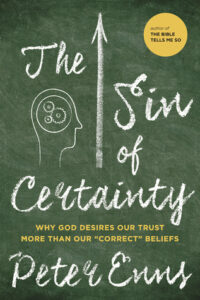 Takeaway: Trust in Christ and Love of other are not in opposition to right theological understanding.
Takeaway: Trust in Christ and Love of other are not in opposition to right theological understanding.
A number of books have been written in the last decade or so that have embraced the acceptance of doubt or at least have normalized having periods of uncertainty as a regular part of the Christian life. It has progressed far enough that there are now books and article rejecting the over embrace of doubt.
Peter Enns has long been a part of this controversy because his own book Inspiration and Incarnation was controversial because some thought that it encouraged an unhealthy doubt. The Sin of Certainty concludes with a long, and very personal, section about Enns’ own doubts, which were exacerbated by the mishandling of the controversy around his earlier book. I will not get into the full story since it is detailed in the book, but Enns was forced out of his job as full professor at Westminster Theological Seminary in 2008 after several years of controversy. (It took 4 years for Enns to get another full time teaching job and even now four years later he is not yet a full professor.)
Enns own story is driving the message of the book. I think it would have been more helpful for the story to have been pushed up in the book to give greater context for why Enns thinks that a focus on certainty is unhelpful. But placed at the end of the book, the story really allows for the book to end strongly.
The Sin of Certainty is going to be misread by many and not read by many more because of the title. To be clear, Enns does not say that we should not have theological boundaries or that orthodoxy is unimportant. Instead he is saying that right belief is not the most important thing for us as Christians. There is a long section about faith being misunderstood in our current culture as theologically correct belief instead of the way that scripture primarily means it, which is trust.
When scripture talks about faith in Christ, it does not ever mean ‘right theological understanding of Christ’. Instead it primarily means that we need to fully trust in Christ. Enns discussion of his own lack of trust in Christ through difficult times makes it clear that actually trusting God is often harder than having correct theological beliefs. (His loss of his job and the eating disorder and recovery of his daughter are two significant places where it is easy to see that trust can be more difficult than theological boundary drawing.)
I do think that the presentation can make it a bit hard for some to actually hear the main message. Enns has been hurt and I think he can be a bit prickly and if you are not a generous reader, you might spend more time than you should arguing with him as author instead of hearing him as a Christians speaking out of his pain and recovery.
Enns is calling on the church to actually trust Christ and love others as their primarily call, not in opposition to right belief and theological boundaries, but as the best way to achieve theological boundaries and right belief. This is a book that makes a lot more sense if you have had a real crisis of faith or walked through a crisis of faith with others. For those that have not had a real crisis of faith, there might not be enough empathy for Enns to hear him well.
The Sin of Certainty: Why God Desires Our Trust More Than Our “Correct” Beliefs by Peter Enns Purchase Links: Hardcover, Kindle Edition, Audible.com Audiobook